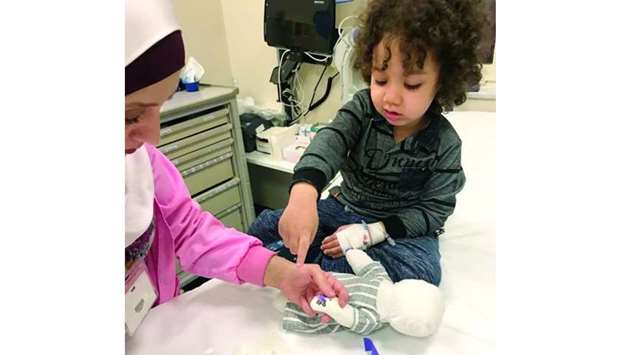The therapeutic play programme, introduced two years ago at Hamad Medical Corporation’s (HMC) Al Wakra Hospital, has helped over 375 paediatric patients to date. The programme helps children better understand their illness and adjust to being in hospital.
The therapeutic play programme is the first of its kind in Qatar and uses ragdolls, puppets, props, and toys to help children express fears they may have about treatment or their illness.
“For most children, spending time at the hospital is stressful. It can often be confusing, frightening, and anxiety provoking. Our therapeutic play programme was designed to provide an outlet for children to express their feelings and anxieties about their illness and their hospital experience. Therapeutic play can help children better understand their illness and it can also help make the process of receiving medication or undergoing tests less stressful, as playing is an excellent distraction,” said Hanan Musleh, head nurse, Paediatric Intensive Care Unit, Al Wakra Hospital.
The programme uses toys, free play, storytelling, games, colouring, and drawing to familiarise children with various medical conditions, diagnostic tests, treatments, and hospital equipment and staff. Musleh said the programme was initially introduced by the Paediatric Intensive Care Unit nursing team to visually explain planned medical procedures to patients.
“Here at Al Wakra Hospital, we have developed a therapeutic approach that uses play and simulation to help children better understand and manage their illness. Many of our paediatric inpatients, both long- and short-term, have benefited from this programme. We have a team of nurses from different sections of the hospital who volunteer their time to manufacture the ragdolls that are used as part of the programme,” said Musleh.
According to Musleh, the therapeutic play can assist healing and rehabilitation. Medical evidence shows the approach can speed up recovery rates and decrease sensitivity to pain. She says it can also help children build emotional resilience by empowering them, noting that it allows children to make decisions about their care.
“In therapeutic play, planned treatments are demonstrated on a puppet with the child participating in the demonstration. For example, the child will be asked to administer a needle to the puppet or replace a bandage. Therapeutic play helps the child to understand and accept the planned treatment and is also useful in alleviating fears and helping the child to verbalise questions and concerns. It is an effective way to meet the emotional needs of children who have an illness or require surgery,” added Musleh.
“For most children, spending time at the hospital is stressful. It can often be confusing, frightening, and anxiety provoking. Our therapeutic play programme was designed to provide an outlet for children to express their feelings and anxieties about their illness and their hospital experience. Therapeutic play can help children better understand their illness and it can also help make the process of receiving medication or undergoing tests less stressful, as playing is an excellent distraction,” said Hanan Musleh, head nurse, Paediatric Intensive Care Unit, Al Wakra Hospital.
The programme uses toys, free play, storytelling, games, colouring, and drawing to familiarise children with various medical conditions, diagnostic tests, treatments, and hospital equipment and staff. Musleh said the programme was initially introduced by the Paediatric Intensive Care Unit nursing team to visually explain planned medical procedures to patients.
“Here at Al Wakra Hospital, we have developed a therapeutic approach that uses play and simulation to help children better understand and manage their illness. Many of our paediatric inpatients, both long- and short-term, have benefited from this programme. We have a team of nurses from different sections of the hospital who volunteer their time to manufacture the ragdolls that are used as part of the programme,” said Musleh.
According to Musleh, the therapeutic play can assist healing and rehabilitation. Medical evidence shows the approach can speed up recovery rates and decrease sensitivity to pain. She says it can also help children build emotional resilience by empowering them, noting that it allows children to make decisions about their care.
“In therapeutic play, planned treatments are demonstrated on a puppet with the child participating in the demonstration. For example, the child will be asked to administer a needle to the puppet or replace a bandage. Therapeutic play helps the child to understand and accept the planned treatment and is also useful in alleviating fears and helping the child to verbalise questions and concerns. It is an effective way to meet the emotional needs of children who have an illness or require surgery,” added Musleh.

